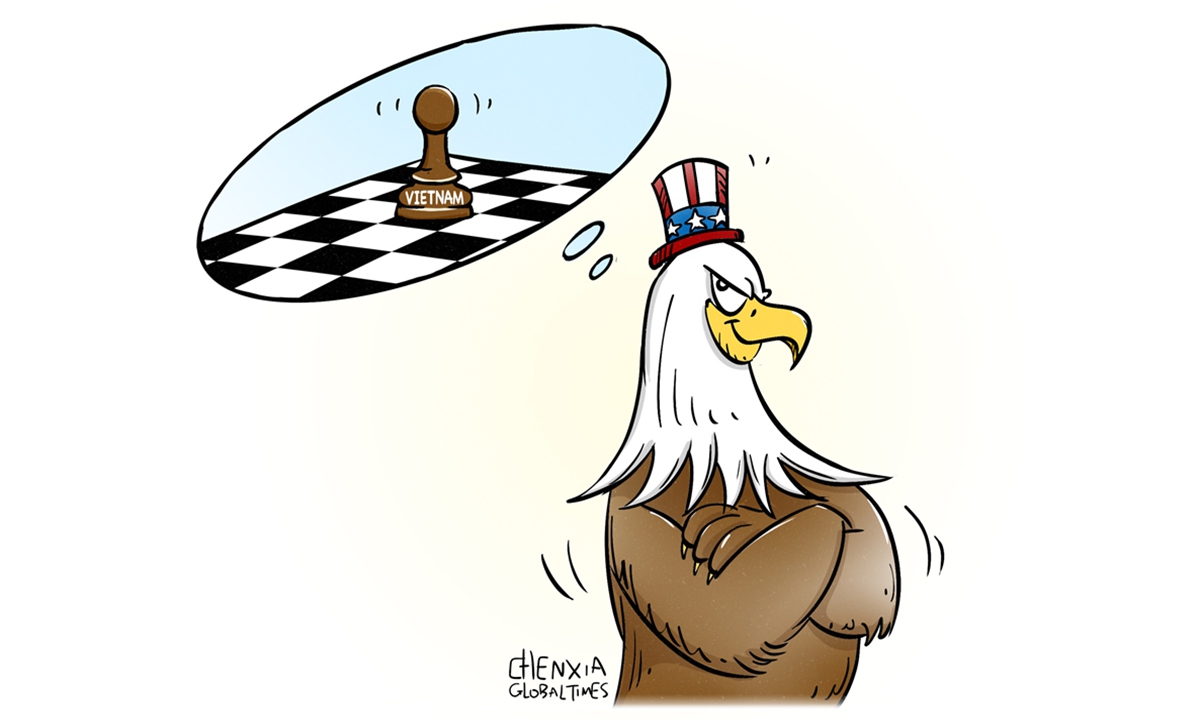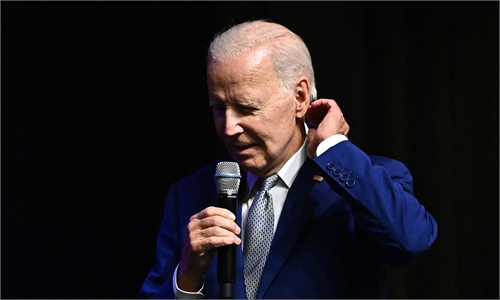
Illustration: Chen Xia/Global Times
After attending the G20 Summit in New Delhi, US President Joe Biden made a short visit to Vietnam. In Hanoi, the US and Vietnam elevated their relationship to a comprehensive strategic partnership, mirroring the comprehensive strategic partnership of cooperation between China and Vietnam in the new era. According to some foreign media outlets, the upgrade allows US-Vietnam ties to reach the same tier as Vietnam's relations with China, Russia. It appears that the US' strategy of encircling China from the south has made new progress.
Given the South China Sea dispute between China and Vietnam, the US-Vietnam relationship has undergone a smooth progression in recent years. In 2016, former US president Barack Obama visited Vietnam, becoming the third US president to visit the country after the Vietnam War. Then both Donald Trump and Biden made their visits there. While the US hopes to turn Vietnam into a "second Philippines," it is aware of the challenges in achieving this goal and is willing to settle for less.
With substantial progress in US-Vietnam relations, the US hopes that Vietnam can absorb some industries transferred from China and become a new center for low-cost manufacturing. Biden's visit aligns with the US' desire to increase chip manufacturing and rare earth production in Vietnam.
Vietnam is smart, benefiting from the long-term governance of the Communist Party of Vietnam, it has fostered stable strategic thinking compared to the Philippines. Hanoi is committed to developing strong relations with the US and Western countries as a bargaining chip in its competition with China over the South China Sea affairs. Simultaneously, Hanoi seeks to expand Vietnam's economic opportunities and gain access to advanced technology. The Communist Party of Vietnam has set a goal of building Vietnam into a strong and prosperous country which is able to stand shoulder-to-shoulder with powers around the world in 2045.
However, Vietnam will not form a strategic alliance with the US, nor will it align with the US on the Taiwan question or the issue of "isolating China." As long as China and Vietnam do not have intense conflicts in the South China Sea issue, Hanoi will continue to maintain friendly cooperation with China while pursuing friendly cooperation with Russia and the US. Vietnam aims to avoid offending any party and achieve a balance of interests from all three sides
Striking a balance among major powers serves Vietnam's interests best. China remains Vietnam's largest trading partner. Vietnam and China are neighbors, and any confrontation with China would have adverse consequences for Vietnam, leaving it with the only option of siding with the US and succumbing to Washington.
Furthermore, Vietnam, being a socialist country, faces similar long-term political challenges as China. While the US is actively developing its relationship with Vietnam, there is also frequent criticism toward Vietnam's "human rights issues" from the US. The Vietnam Reform Revolutionary Party, primarily composed of descendants of Vietnamese refugees in the US, always aims at realizing a color revolution in Vietnam.
Vietnam's national political stability always faces risks from the US and the West. China, on the other hand, serves as its biggest external support for political stability. The relationship between the Communist Parties of China and Vietnam serves as a solid bond.
Maritime disputes have long been an obstacle between China and Vietnam. Vietnam not only claims sovereignty over the Nansha Islands but also has ambitions for the Xisha Islands. These disputes cannot be resolved in the short term. However, siding with the US in the strategic competition between China and the US does not serve Vietnam's long-term political and economic interests, nor does it provide true strategic security. Therefore, Vietnam is likely to pursue a "Vietnamese-style neutral route" between China and the US, which will be more cautious and serious than the neutrality of the Philippines and India.
Chinese people need not worry about Vietnam's warm relationship with the US. Vietnam, with a population of about 98 million, belongs to the Confucian civilization circle. In Hanoi, one can find temples with Chinese characters and historical examination halls where imperial examinations were held. While Vietnam's economy is currently growing rapidly, at a speed that has surpassed that of China, its per capita GDP is just below $4,000, lower than that of Yunnan Province and Guangxi Zhuang Autonomous Region in China, and there is a significant gap compared to the Pearl River Delta. Vietnam has never surpassed China in terms of economic development.
Let us engage patiently with this southern neighbor as it seeks to maximize its interests in the strategic competition between China and the US. I believe that China and Vietnam have the ability to continuously promote their bilateral relationship in a positive and stable direction, benefiting both countries.
The author is a Chinese media professional. opinion@globaltimes.com.cn


